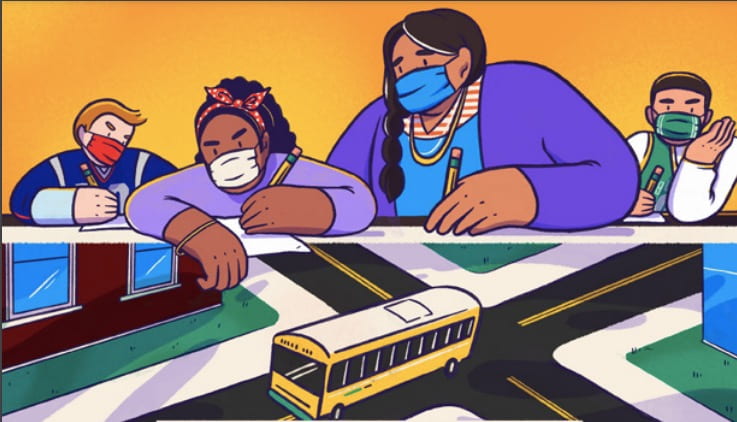Boston’s mayoral race will make history this year. All five candidates in the crowded race identify as people of color. Whoever wins will be the first person in city history to not be a white man.
Right now, polls show that Michelle Wu leads the race. She has distinguished herself as a climate candidate. Recently, she has made headlines for her “Green New Deal for Boston Public Schools”—Wu’s answer to overhauling Boston Public Schools, a hot-button campaign issue.
What is the Green New Deal for Boston Public Schools?
The Green New Deal for Boston Public Schools focuses on transforming public school building infrastructure, as part of Wu’s Community Vision for Boston’s Students and Families.
Today, the school system represents nearly half of Boston’s municipal emissions. Wu’s plan places Boston Public Schools at the center of her plan to reduce city carbon emissions and achieve carbon neutrality.
Schools already provide critical social services and community functions, including education, childcare, and meeting spaces. Using school spaces for a broader variety of community activities would consolidate municipal functions to fewer buildings and parking lots.
Environmental justice will guide Wu’s proposed transformation of school infrastructure. Schools with disproportionately high populations of students of color, particularly those near airports or major highways, would be prioritized in the creation of healthier infrastructure.
Wu’s plan would also reduce transportation emissions by electrifying school buses, creating walkable routes to schools, and providing students with free public transit passes.
What is Wu’s broader climate plan?
Wu’s Boston Green New Deal & Just Recovery Plan, announced in August 2020, aims to address both climate justice and the Covid-19 pandemic recovery together. It strives to show how cities can be leaders in combating inequity.
“Ultimately,” reads the report, “a Green New Deal for Boston would seek to mitigate the threat of climate change, attack poverty, and economic inequality, close the wealth gap, and dismantle structural racism at the scale necessary for a Just Recovery from the devastation of this pandemic.”
Along with the overhaul of Boston Public Schools, the plan contains sweeping recommendations to enact climate and social justice-centered policy.
These include a “justice audit” of internal city processes, an Urban Climate Corps and green jobs program, and divestment from fossil fuels, gun-manufacturing, and prison industries.
The plan also highlights transportation and food justice. Transportation justice means increasing accessibility and public health through fare-free and low-carbon public transit. Food justice policies, focused on supporting community gardens and land trusts, are motivated by a belief that “universal access to nutritious food is fundamental for public health, and economic opportunity, as well as social resilience in the face of climate change and natural disasters.”
While a majority of candidates in the race have endorsed some form of just climate action, only one other candidate has released a comprehensive plan. In a recent interview of the candidates, Wu was the only one who promised to take climate action in her first 90 days.
What does this have to do with the federal Green New Deal?
Wu’s Boston Green New Deal is inspired by Alexandria Ocasio Cortez’s Green New Deal resolution. Recognizing that national progress on the proposal has stalled, Wu’s plan seeks to imagine a way forward with cities at the wheel.
The Boston Green New Deal shows how the national proposal has changed the conversation about climate solutions at all levels of government. Wu’s hope is that “cities can take even more immediate action to shape a more just and sustainable future.”
The de facto slogan of the federal Green New Deal is “millions of good jobs and a livable future.” Green job creation is at the heart of Wu’s plan for Boston, too. Wu’s plan would create jobs in the green energy sector, establish an Urban Climate Corps, and provide green jobs training to communities historically left out of the renewable energy economy.
Similarly, the federal Green New Deal prescribes creating green infrastructure through transforming housing policy. Legislators at the federal level have introduced a vision for transformative green housing policy that focuses on renewable electricity and climate resiliency in public housing. Wu’s plan, adapting the framework to Boston’s needs, extends that approach to include cooperatively owned housing and community land trusts.
Have other cities passed similar plans?
Wu’s is the first comprehensive and local Green New Deal plan. But politicians and community activists have been working towards similar ideas for the past several years.
New York State’s Climate Leadership and Community Protection Act, enacted in 2019, comes the closest (though at the state, not the city, level). The historic law committed the state to reduce emissions, create jobs through a clean energy transition, and prioritize public health in marginalized communities.
In 2019, Los Angeles Mayor Eric Garcetti released an update to the city’s sustainability plan. The plan made new recommendations for meeting the city’s aggressive climate goals through economic and social transformation, which Sierra Club bloggers called “the Green New Deal in practice.”
In Portland, Oregon, a community-organized referendum established the Portland Clean Energy Fund. The fund, now underway, uses a corporate tax to provide money for “environmentally-friendly job creation and sustainable building projects that will benefit low-income people and people of color.”
What this means: localities can lead
A Green New Deal is unlikely to pass at the federal level anytime soon. The Boston Green New Deal reflects just how deeply the federal proposal has shaped climate solutions moving forward. While Congress remains stalemated by partisan politics, Michelle Wu, if elected, will show how cities can take the lead.
